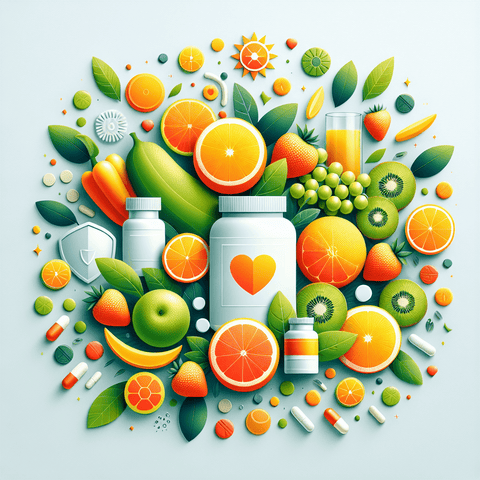Understanding Vitamin C in Nutritional Supplements: Why It Matters for Your Health
Vitamin C — scientifically known as ascorbic acid — is a water-soluble vitamin vital to multiple functions in the body. It contributes to normal collagen formation for the normal function of the skin, blood vessels, bones, cartilage, gums, and teeth. It also supports the protection of cells from oxidative stress, helps regenerate the reduced form of vitamin E, and increases iron absorption. Due to its widespread functionality, maintaining adequate levels of vitamin C is crucial for optimal health.
Because the human body cannot produce or store vitamin C in significant amounts, daily intake is required either through diet or supplementation. The European Food Safety Authority (EFSA) recommends a daily intake of 80 mg for healthy adults. However, individual needs vary, especially under different physiological states such as stress, aging, smoking, or during physical exertion. These situations may increase vitamin C turnover in the body and, in turn, elevate the need for supplementation.
Supplementation becomes particularly relevant when dietary intake is insufficient, or when individuals are at risk of deficiency. In urban lifestyles, processed food consumption and lower intake of raw fruits and vegetables may compromise vitamin C consumption. This is where high-quality vitamin C supplements can help bridge nutritional gaps efficiently and safely. The supplement market offers numerous delivery forms — capsules, powders, liquids, and more — making it easier for consumers to meet their individual requirements. To explore vitamin C supplements aimed at supporting energy, antioxidant protection, and immunity, browse our Vitamin C collection here.
In essence, understanding how vitamin C operates in supplements and being aware of one’s unique nutritional needs is the first step towards leveraging this powerful micronutrient. As we progress through this article, we'll explore the top vitamin C options — both natural and synthetic — and determine which source truly earns the title of “king of vitamin C.”
Ascorbic Acid Sources: The Most Common and Effective Forms of Vitamin C Supplements
Ascorbic acid is the chemically pure form of vitamin C and is most commonly synthesized in laboratories from glucose. Molecularly identical to the vitamin C found in food sources, synthetic ascorbic acid works effectively in supporting normal physiological functions. It's found in a variety of consumer formulations aimed at meeting diverse nutritional preferences, including capsules, chewable tablets, powders, and liquids.
Each form of vitamin C supplement has its advantages. Capsules are easy to swallow and are ideal for convenient daily intake. Powders allow precise dosing and are perfect for those who prefer their nutrients in smoothies or water mixtures. Liquids accommodate individuals who have difficulty swallowing pills, such as the elderly or children. Chewable forms often come with added flavor and are favored by both adults and children for ease of use.
When comparing synthetic versus natural sources of vitamin C, several studies suggest bioequivalence — meaning both forms are absorbed and utilized similarly by the body. However, advanced formulations like buffered vitamin C or liposomal vitamin C improve gastrointestinal tolerance and absorption. Buffered vitamin C combines ascorbic acid with minerals (like calcium, magnesium, or potassium), reducing acidity and the risk of gastric irritation. Liposomal formulations encapsulate the vitamin in lipid layers, enhancing cellular uptake and transport through the bloodstream.
Choosing between pure and processed forms means evaluating not just the dose, but the filler, additive, and excipient profile. Shoppers should seek out third-party tested, allergen-free supplements without unnecessary additives. For shoppers wanting the highest-quality formulations of vitamin C such as liposomal or buffered variants, explore our top-tier product selection here. Look for products that are free from GMOs, dairy, gluten, and artificial preservatives for sustained safety and effectiveness.
Ultimately, the synthetic form of vitamin C provides a highly controlled and convenient solution for addressing dietary gaps. Whether you're fighting seasonal discomfort, recovering from intense physical workouts, or simply aiming for optimal health support, ascorbic acid supplements offer reliable bioavailability and versatile formats suited to modern lifestyles.
Natural Vitamin C Rich Foods: Nature’s Best Sources for Optimal Absorption
While supplements serve as an effective means to ensure adequate vitamin C uptake, nature offers an abundant array of food sources that not only supply the nutrient in a bioavailable form but also deliver accompanying phytochemicals that support its function. Some of the richest fruit sources of vitamin C include guavas — a single fruit can provide over 200 mg of vitamin C — along with kiwis, strawberries, oranges, and grapefruits. These fruits are widely available, palatable, and easy to incorporate into daily meals or snacks.
Vegetables are equally impressive. Bell peppers (especially yellow variants) surpass citrus fruits in vitamin C content, containing more than 150 mg per 100 grams. Likewise, broccoli, Brussels sprouts, kale, spinach, and cauliflower contribute significant amounts along with vital fiber, minerals, and antioxidants. Interestingly, quick steaming over boiling preserves more of the water-soluble vitamin during the cooking process.
When comparing food sources to supplements, one considers factors like bioavailability, synergistic compounds, and ease of integration into the diet. Vitamin C in its natural form often comes bound with bioflavonoids, which some studies suggest might enhance absorption — although this remains inconclusive. Additionally, whole foods deliver a matrix of nutrients that interact positively with vitamins and contribute to overall health, such as the fiber and polyphenols found in fruits and vegetables.
However, challenges exist. Cooking processes can degrade vitamin C, and produce may lose potency during storage or transportation. For individuals with limited access to fresh fruits and vegetables or with specific dietary restrictions, relying solely on dietary sources may not suffice. That’s where well-formulated supplements play a complementary role — ensuring individuals meet their vitamin C needs reliably while still consuming whole foods for holistic health benefits.
For those interested in boosting vitamin intake through more than just vitamin C, supplements of magnesium for energy and muscle support, or vitamin D for bone and immune health might also be valuable additions to a comprehensive wellness plan.
Best Vitamin C Supplements on the Market: Which One Reigns Supreme?
Identifying the best vitamin C supplement hinges on understanding the criteria that define quality, effectiveness, and individual compatibility. Superior supplements stem from stringent sourcing standards, minimal processing, clinically efficient delivery systems, and transparent labeling practices. Criteria such as potency, bioavailability, third-party testing, and absence of harmful excipients all factor into what makes one product superior to another.
Current research favors specific types of advanced delivery systems in vitamin C supplementation. Liposomal vitamin C, for example, offers increased absorption by encapsulating the vitamin in microscopic fat-like particles that deliver the nutrient directly into the bloodstream. User feedback often supports a noticeable difference in energy levels and general wellness when switching to liposomal formats. Buffered vitamin C helps reduce acidity, making it a smart choice for individuals with sensitive stomachs. Slow-release formulations offer sustained vitamin C availability throughout the day, beneficial for steady immune support.
When it comes to brand comparison, consumers are encouraged to look for companies with transparent ingredient sourcing, compliance with Good Manufacturing Practices (GMP), and detailed product specifications. It's also essential to consider the type of population a supplement is tailored for. Athletes, for instance, may benefit from buffered or high-dose vitamin C to support tissue repair and immune resilience during intense physical activity. Seniors and vegetarians might prefer lower-acid and non-animal derived capsules that are easy to ingest and free from gelatin. Children may find chewables and liquid formulations more acceptable.
It is wise to avoid formulations with excessive artificial coloring, synthetic sweeteners such as aspartame, or additives like titanium dioxide. Check for allergen-free status — especially gluten, dairy, soy — and certifications that ensure product integrity.
Topvitamine.com offers a curated range of science-backed vitamin C supplements. We recommend exploring our vitamin C collection for high-absorption options designed to match diverse preferences across age and health goals.
Out of the available forms, liposomal vitamin C leads the pack in absorption dynamics, followed closely by buffered formulas for tolerability. However, the true “king” may vary depending on the specific needs of the individual, which we’ll explore in a later section.
Vitamin C Benefits for Immunity: Unlocking the Body’s Natural Defense System
Vitamin C's connection to immune health is perhaps its most well-known attribute. Its role in supporting the immune system is multifaceted. It contributes to normal function of the immune system during and after intense physical exercise (when taken at doses of 200 mg or more above the daily recommendation). It also helps maintain the normal function of the immune system and supports protection from oxidative damage, one of the mechanisms commonly associated with infection onset and progression.
White blood cells — our immune system's front-line defenders — have high concentrations of vitamin C. It supports their growth, differentiation, and active function, particularly phagocytic activity and production of immune mediators. Vitamin C also facilitates the skin’s barrier function, soft tissue repair, and wound closure via collagen stabilization.
Clinical studies have demonstrated that populations under stress — such as athletes, soldiers, or individuals exposed to cold weather — show reduced incidence and duration of common illnesses like the cold upon vitamin C supplementation. Though its ability to prevent disease is limited to specific populations under specific conditions, evidence does support vitamin C’s role in modulating immune defense mechanisms in responsive individuals.
Given its antioxidant power, vitamin C also neutralizes free radicals that would otherwise damage cell membranes, renal systems, and the cardiovascular system. By reducing oxidative stress, it helps maintain systemic balance and aligns with efficient immune performance.
Because immune resilience is not provided by vitamin C alone, a holistic approach to wellness includes other critical support nutrients such as vitamin D and omega-3 fatty acids like DHA and EPA, which synergize with vitamin C for comprehensive immune function.
Vitamin C Deficiency Symptoms: Recognizing When You Need More
Low levels of vitamin C can lead to a wide variety of physiological issues. While scurvy — the most severe form of deficiency characterized by bleeding gums, poor wound healing, and joint pain — has become rare in developed countries, mild to moderate deficiencies remain common. Early warning signs include fatigue, mood changes, irritability, slow healing, and dry or rough skin.
Certain populations are more vulnerable to deficiencies. Smokers require higher intakes due to increased oxidative stress and faster vitamin C turnover. The elderly face absorption challenges and dietary limitations. People with gastrointestinal conditions or those on restrictive diets (such as low-carb or fast-food heavy) may experience insufficient vitamin C intake unknowingly. Additionally, high-performance athletes, people under chronic stress, or those exposed to environmental pollutants may benefit from increased vitamin C intake to counteract elevated free radical production.
While a balanced diet rich in fruits and vegetables can correct mild deficiencies, some cases require targeted supplementation. It’s essential to evaluate the symptoms, examine lifestyle patterns, and consult healthcare providers before starting supplementation.
Fortunately, vitamin C is generally well-tolerated and has a low toxicity risk due to its water solubility — excess amounts are usually expelled via urine. However, doses over 1,000 mg may not be appropriate for everyone. Identifying the correct dosage should take your health status, age, gender, and medical history into account.
Explore our products formulated for targeted nutrient support to help you identify the best intervention for your needs under our vitamin C supplements page.
Which Is the King of Vitamin C?
With numerous options available, from whole foods to synthetic supplements and advanced delivery systems, determining the “king” of vitamin C depends on several critical metrics: bioavailability, dosage reliability, tolerability, user convenience, and individual health context.
Among whole foods, guavas and bell peppers top the list with remarkable concentrations of naturally occurring vitamin C and complementary antioxidants. They also offer other micronutrients and fiber — making them an excellent daily choice for preventive care. However, food-based sources can be less consistent due to cooking losses, seasonal availability, and variations in nutrient density based on soil and storage.
Standard ascorbic acid supplements — the synthetic form of vitamin C — provide milligram-accurate dosing and are typically inexpensive and widely accessible. While effective, they're sometimes poorly tolerated at high doses and don’t offer extended release. Buffered or time-release versions offer enhanced delivery and reduced gastric irritation, making them better suited for sensitive individuals. Liposomal supplements, albeit more expensive, currently top the list in terms of enhanced absorption and biological efficiency.
Considering the broadest range of factors — from precision and bioavailability, to client satisfaction and clinical data — liposomal vitamin C earns the crown as the most advanced and effective form of supplementation. For reliable performance and adaptability to modern lifestyles, this format delivers the best of science, technology, and user experience.
Final Thoughts: Choosing the Best Vitamin C Strategy for Your Health
As with most nutrients, one size does not fit all. The optimal vitamin C strategy depends heavily on your lifestyle, diet, immune needs, and individual health status. Those with access to fresh, vitamin C-rich produce may rely on food. Others, particularly those with higher stress levels, restrictive diets, or digestive challenges, might benefit more from high-quality supplements.
When choosing a vitamin C supplement, prioritize trusted sources, scientific formulation, and proper dosage. Avoid additives, allergens, and fillers that could offset benefits. Consider pairing vitamin C with other synergistic nutrients available from our curated collections, such as vitamin K for bone health or magnesium for energy metabolism.
For safety, it's generally best to start at modest supplement levels (100–500 mg/day) unless medically advised otherwise. Always consult a healthcare professional before dramatically increasing doses or combining with other high-concentration supplements, especially during pregnancy, lactation, or treatment phases for chronic illness.
With growing research, cutting-edge delivery systems, and consumer education, the future of vitamin C supplementation looks promising. Liposomal and synergistically formulated options are evolving rapidly to meet modern health needs with higher precision and better absorption. Whether you're combatting oxidative stress, enhancing immunity, or simply boosting overall health, vitamin C remains a cornerstone nutrient — and liposomal formats are currently sitting on the throne.
Q&A Section
Q: What is the best natural food source of vitamin C?
A: Guava is one of the highest sources, with over 200 mg per fruit. Bell peppers, kiwis, strawberries, and oranges are also excellent choices.
Q: Are synthetic vitamin C supplements effective?
A: Yes, synthetic ascorbic acid is chemically identical to natural vitamin C and performs similarly in the body.
Q: What is the most bioavailable form of vitamin C supplement?
A: Liposomal vitamin C is currently considered the most bioavailable due to its advanced delivery system.
Q: Can vitamin C help with immunity?
A: Yes, it supports immune cell function and helps protect against oxidative stress, particularly when dietary intake is inadequate.
Q: Who needs extra vitamin C?
A: Smokers, elderly individuals, athletes, and those under high stress or with poor diets may benefit from supplemental vitamin C.
Important Keywords
vitamin C supplements, best vitamin C supplement, liposomal vitamin C, buffered vitamin C, natural vitamin C foods, immune system support, ascorbic acid, vitamin C for energy, vitamin C for immunity, vitamin C benefits, vitamin C deficiency symptoms, high bioavailability vitamin C, Topvitamine



